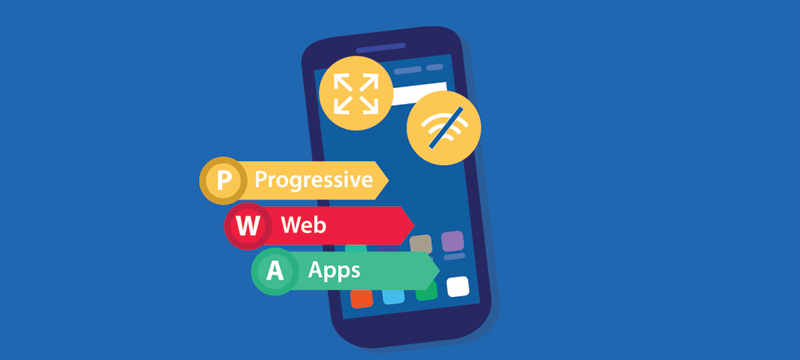Firstly we had the mobile website, then we had the mobile app, now we have the progressive web app a technology that brings together the best of both. The benefits offered by progressive web apps mean they are becoming increasingly popular among leading online businesses and, in this post, we’ll explain what the benefits are.
What are Progressive Web Apps?
Essentially, a progressive web app (PWA) is a website that looks and works just like a mobile app. You can add it to your phone’s applications screen instead of having to search for the site in a browser, it will work whether you are online or offline, it can send notifications and it can even access the device’s hardware.
Six benefits of using a PWA
- A single resource
The popularity of mobile apps has led to a situation where companies are spending a fortune on creating multiple communications channels: they need a website, an iOS app and an Android app. What’s more, as many users will jump from using the app on the phone to a website on a computer, companies need to find a way of syncing everything that happens in order to provide users with a seamless experience.
When you use a PWA, there is no need to spend money developing separate apps as the website and the app are one and the same thing. This also means there is no need to sync data between two different channels. - It works offline
Despite all your efforts to provide a website with high availability, if a user is offline or has a poor network signal, they won’t be able to access it. This can be a significant problem if your customers are in situations where this can happen, such as when flying, using the underground or when they are in remote areas.
A PWA, however, works like a stand-alone mobile app, allowing your users to continue accessing the app when not online. Although information can’t be updated or synced with other devices until there is an internet connection, they can still access information cached on the phone’s hardware and this can help them to stay engaged with your brand. It is also possible for them to undertake activities offline that can be saved and then implemented once the device is reconnected such as sending a message.
This feature can also be used by eCommerce sites which can store products on the phone for browsing offline. Shoppers can add items to their cart and the PWA can be programmed to send them a reminder notification once they are back online. Some PWAs can even enable sales to take place when offline, though the payments have to wait for an internet connection before being processed as verification is required. - The indexable app
While apps are generally much more user-friendly for phones than websites, one of their biggest downsides is that their content isn’t searchable online. You can’t find it on Google or Bing. A PWA, on the other hand, gives you both the user-friendly interface of a mobile app and the ability to be indexed by search engines. While it looks and works like an app, it is a website and this means it can be found by users looking for it online. - Formula 1 performance
In order to function offline, PWAs use caching to store data on a user’s device. This means they load exceptionally quickly on a mobile phone and the only data which needs transferring is any updated dynamic content. Indeed, the average PWA loads 2 to 3 times faster than standard mobile sites, leading to lower abandonment rates, improved customer engagement, higher conversion rates and better ranking on search engines. In addition, the reduced amount of data needing to be sent means your server load is significantly less and this helps your site perform better during periods of heavy traffic. - No install no updates
In the same way that long checkout processes cause people to abandon checkouts, long app installations also prevent people from downloading them. With most mobile apps, you’ll need to visit Google Play or Apple App Store, find the app and then wait for it to download. You may also be required to set up a login before you can use it. It’s a process that, for many, is too longwinded to bother.
This isn’t the case with a PWA. When a user installs a PWA, it is downloaded instantly without them being redirected to a store and as it’s a website, it won’t be constantly updating to the latest version. - Avoid app store issues
The other benefit of not having to send your users to Google Play or the App store is that you won’t need to meet all the app regulations that Google and Apple impose on app developers before they give approval.
While many of these regulations are important for protecting the privacy and security of users, as you have developed a specialised website rather than an actual app, you are not required to go through this process. Without having to go through Google or Apple, you can get your updates to market quicker than using a separate app.
Conclusion
As you can see, progressive web apps offer the best of both types of technology a website that looks and works as an app. It provides the ease of use, speed and offline functionality of the app while taking away the cost and complexity of managing multiple communication channels. If you are looking for high availability, high performance hosting for your website or PWA, visit our homepage to see our wide range of hosting solutions.


